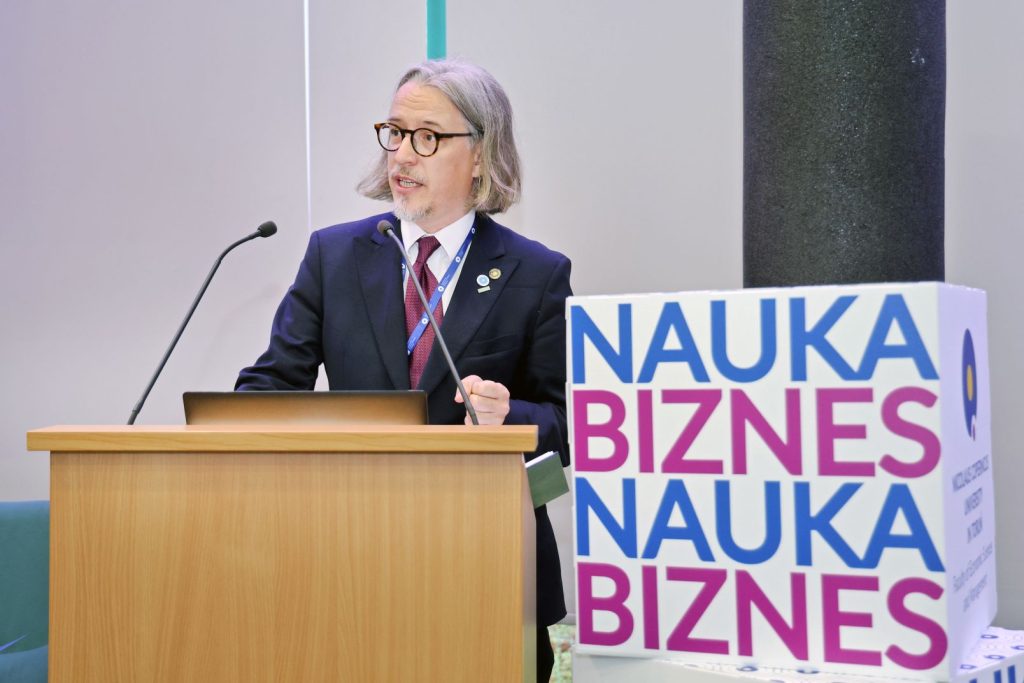Building an innovation ecosystem in which the University acts as a business partner, technology pioneer, and knowledge transfer hub was the theme of the “Funds for Science” conference, jointly organized on October 27 by the Nicolaus Copernicus University Center for Academic Entrepreneurship and Technology Transfer and the European Innovation Foundation.

The event aimed to bring together representatives of the scientific, business, and financial communities to discuss the topic of supporting innovative projects in Poland and Europe.
The conference opened with an inaugural lecture by Dr. Adam Kola, professor at Nicolaus Copernicus University and vice-rector for science, entitled “European innovation policy and the role of the scientific sector.” During the lecture, a plan to change EU financial policy was presented.
The discussion panels, which included representatives of science, investment funds, and entrepreneurs, provided an opportunity to talk about barriers to commercial financing of science, potential sources of financing for R&D, and the benefits and potential opportunities for successful cooperation between science and business. The discussion panels were attended by, among others:
- Radosław Sojak, PhD, professor at Nicolaus Copernicus University, vice-rector for human resources and financial policy
- Tomasz Biel – European Innovation Foundation
- Piotr Szulec – SKARBIEC TFI SA
- Jarosław Wikaliński – IPOPEMA TFI SA
- Michał Żółtowski, PhD – Chamber of Commerce of Alternative Investment Companies
- Maciej Wieloch, PhD – IIF.VC sp. z o.o.
- Jan Kozak, PhD, Prof. UE – ŁUKASIEWICZ Research Network
- Michał Polasik, PhD, Prof. UMK – Nicolaus Copernicus University
- Robert Sitnik, PhD, Eng. – Warsaw University of Technology Investment Factory
- Andrzej Wolan, PhD – Nicolaus Copernicus University, President of the Management Board of FRESH INSET SA, Synthex Technologies sp. z o.o., member of the Supervisory Board of NOCTILUCA SA
- Michał Jackowiak – ECOM sp. z o.o.
- Artur Olech – Trasti
- Tomasz Czech, Prof. URK – URK Innovation Center sp. z o.o.
- Cezary Odrzygóźdź, PhD Eng. – Director of CPATT
- Alicja Ostrowska-Leszczyńska AMU Innovation sp. z o.o.
The creation of the InsurTech Europe cluster is a response to changes in the ways of financing science in Europe – Dr. Michał Polasik, professor at the Nicolaus Copernicus University in Toruń, Department of Digital Economy and Finance, Faculty of Economics and Management. “For us, as Nicolaus Copernicus University, it is important whether the values we create in Toruń or Bydgoszcz, inventions, new solutions, and innovations, will be developed and commercialized here or elsewhere. The establishment of the cluster and the creation of our own model of cooperation between the university, business, and the financial sector shows that we are not just copying models, but creating our own original solutions.
Investment funds, including venture capital (VC) funds and technology funds, play a critical role in the innovation ecosystem, especially when a university wants to translate research results into products, services, or spin-offs. Funds can support universities in the following activities:
- financing the proof-of-concept phase – many research projects need support to move from the laboratory to the market;
- scaling and commercialization – funds can support startups or spin-offs created at the university in the growth phase;
- co-investment and partnership building – funds can act as partners to universities, helping to build relationships with industry;
- establishing contacts with the market – the involvement of funds acts as a signal to other investors and business partners that the project has commercial potential.
The Academic Entrepreneurship Forum “Funds for Science,” under the honorary patronage of the Mayor of Toruń, the Chamber of Commerce of Alternative Investment Companies, and the Chamber of Fund and Asset Management at Nicolaus Copernicus University, sends an important signal to potential investors that the university is ready and willing to act as an active partner in the innovation ecosystem – combining science, business, and investment. However, the event itself is only the beginning. The key is a systemic approach, optimal use of infrastructure, creating a culture of cooperation, and developing financing mechanisms and real tools to support scientists and entrepreneurs in their joint activities.
